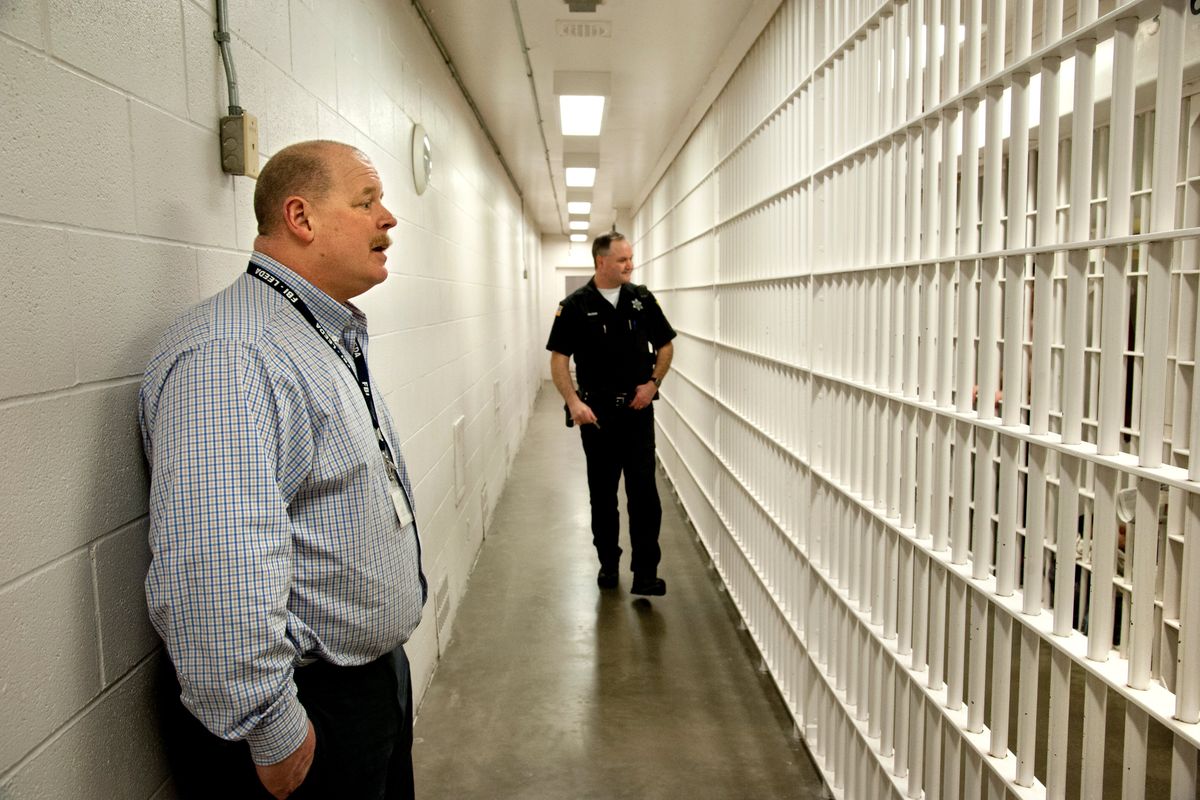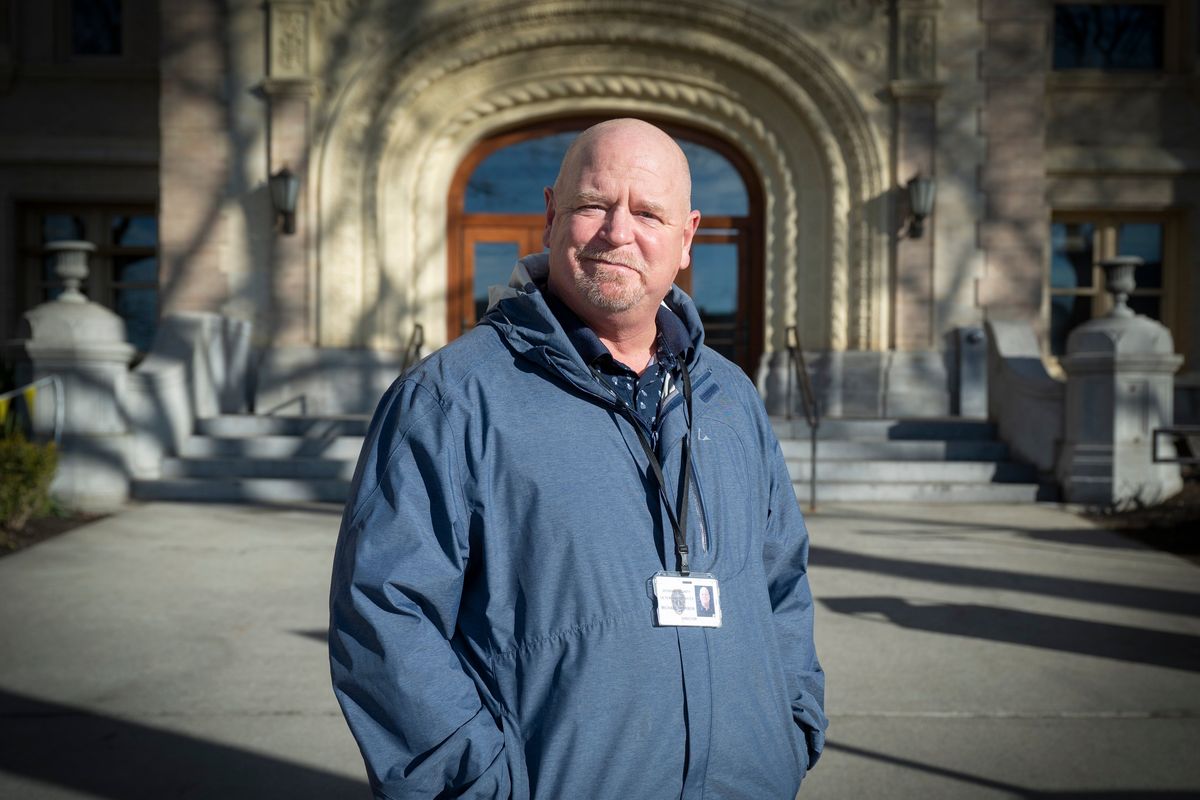‘Change is never comfortable’: Purview of county’s new senior director of law and justice includes medical examiner, public defenders, detention
Mike Sparber, who has worked in Spokane County Detention Services since 1988, has become the county’s first senior director of law and justice. He will oversee the public defender’s office, pretrial services, detention services, the medical examiner’s office and the regional law and justice administrator. (JESSE TINSLEY/THE SPOKESMAN-REVIEW)Buy a print of this photo
Mike Sparber started his county government career at the bottom.
In 1988, the Spokane native became a corrections officer. It was a change of direction after time in the military and jobs as a welder and metal fabricator.
Sparber worked his way up to lieutenant; then assistant director of detention services. In 2019, the Spokane County commissioners promoted him to director.
No one had ever climbed from corrections officer to director. Sparber, an Eastern Washington University graduate, says he stayed with the job through the decades because it gave him an opportunity to help people.
“In my industry, you work with inmates,” he said. “All of them are having the worst days of their lives because they’re here. I always felt it was my role to help them understand that we’re here to help them get through the process.”
After 34 years with the county, Sparber has been promoted once again. He’s now the county’s first senior director of law and justice.
The new role is part of a larger effort by Spokane County CEO Scott Simmons to reorganize the county’s leadership structure. The intent, Simmons says, is to increase efficiency, clarify chains of command and improve communication between departments.
As senior director of law and justice, Sparber will oversee the parts of the county’s criminal justice system that aren’t run by elected officials. That includes pretrial services, law and justice administration, the medical examiner’s office, detention services, the public defender’s office and counsel for defense – which takes cases that present a conflict of interest for the public defender’s office.
Spokane County Commissioner Josh Kerns said Sparber’s background makes him a perfect fit for the new job. He added that it reflects well on the county when employees stay for more than three decades, and emphasized the former jail manager is well-liked.
“Mike is a good guy,” Kerns said. “I don’t know anybody that would say anything bad about Mike Sparber.”
Sparber explained that the new position gives the county an employee who can focus on big-picture issues. Individual departments often focus narrowly on their own responsibilities, he said, but the senior director of law and justice can assess all the “bits and pieces” and guide them toward a common goal.
“What needs to happen is there needs to be a good, focused look at the overall processes and how those decisions along the way impact the folks up or downstream,” he said.
Sparber will be intimately familiar with one part of his new job – overseeing detention services.
Not only did he serve as detention services director, he also served as project manager when the county was actively considering the construction of a new jail.
A new jail hasn’t been built, but Sparber took courses at the National Institute of Corrections to learn more about jail projects. If the county had decided to move forward, Sparber would have helped lead the effort.
At this point, Sparber said he thinks the jail discussion has shifted. He said he hopes the county will soon start considering the creation of a community corrections center.
A community corrections center would provide qualified inmates with various programs and opportunities to turn their lives around, Sparber said. For instance, it could help people get their GEDs, find housing or fight addiction.
Spokane City Council President Breean Beggs, a reform advocate and longtime attorney, said he doesn’t think a community corrections center would be the best move.
It would cost millions, he said, and the county should be investing more in projects like the Spokane Regional Stabilization Center. That facility, which opened this fall, diverts people from the Spokane County Jail and connects them with resources to help them fight addiction and mental health issues.
“That’s where we need to go,” Beggs said. “They don’t have to be lockups.”
Regardless of what route the county takes, there’s consensus that the current system isn’t working.
“Everyone understands that the model we have for the jail right now is not efficient,” Sparber said. “The jail is still crowded. The jail was designed for 462 (inmates), we on average have 675 in the jail right now. We’ve double-bunked spaces that should have remained single-bunked.”
As part of his new responsibilities, Sparber will be overseeing the county’s reform efforts. For instance, it’ll be up to him whether the county hires a new regional law and justice administrator to replace Maggie Yates, who resigned in January and oversaw the county’s reform efforts for the past 3½ years.
Sparber said he wants to start evaluating all of the county’s ongoing reform programs.
“What are the projects?” Sparber asked. “What problems are they solving, how long have they been in process, where is the supporting data for it, is it doing the things we asked it to do, how much money is being spent on it?”
In Yates’ absence, Sparber will take over the county’s supported release program.
The proposal has faced resistance from the prosecutor’s office, but if it moves forward it will give District Court judges the option of releasing nonviolent defendants awaiting trial and connecting them with resources – such as assistance for housing, drug addiction and mental health issues – instead of holding them in jail on a low bond.
Sparber said he’s eager to explore ways to improve the county’s criminal justice system and explained that despite his jail background, he has experience outside of detention services.
For instance, Sparber was the county’s representative on the Blueprint for Reform, which former U.S. Attorney Jim McDevitt, retired Superior Court Judge Jim Murphy and attorney Phillip Wetzel wrote in 2013. He also served as a fill-in regional law and justice administrator between the tenures of Jacqueline van Wormer and Yates.
Sparber said those experiences, plus his time on the Spokane Regional Law and Justice Council, have given him a good understanding of the entire criminal justice system.
Beggs said he doesn’t think Sparber’s jail background will necessarily inhibit his ability to implement reforms so long as he surrounds himself with people with the right expertise.
“His experience in detention services has led him to understand how broken and dysfunctional the current system is,” Beggs said. “I have personally found him open to solutions, but like the judges, he needs more resources and more tools.”
Sparber said his ultimate goal is to make sure the criminal justice system moves in the right direction.
“Change is never comfortable,” he said. “People, water and electricity all flow to the path of least resistance. No one is really up for change, but it’s necessary.”


